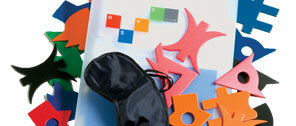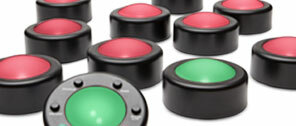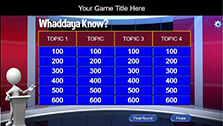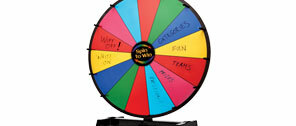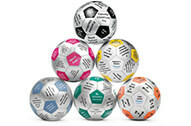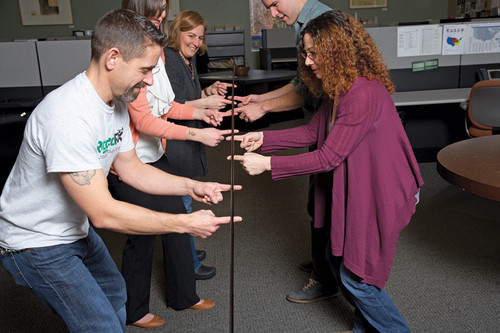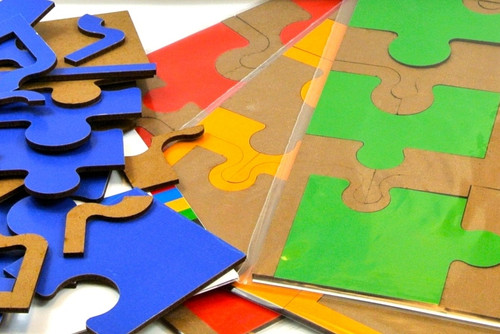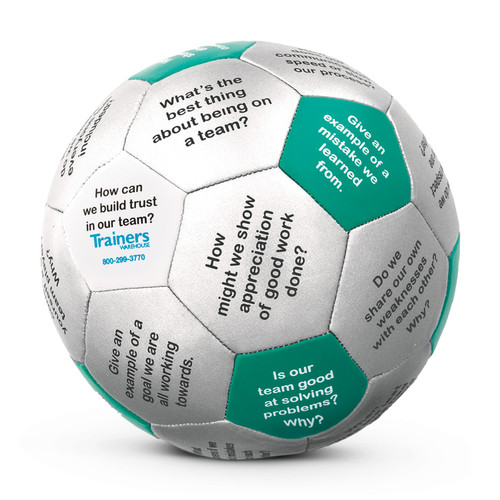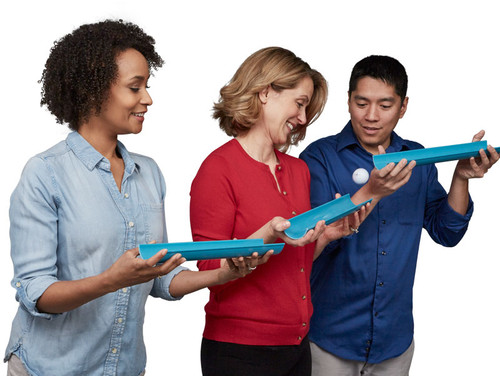Helium Stick® is a fast, high-impact team-building activity that strengthens communication, alignment, and collaboration. This lightweight, collapsible rod is built for facilitators—it packs small, sets up in minutes, and delivers memorable learning in a 20–30 minute session. The challenge is to lower a lightweight rod to the ground with your team—but it’s harder than it seems! As fingers press upward on the stick, it mysteriously “floats,” sparking laughter, frustration, and eventually insight. Trainers Warehouse’s finished version elevates this popular activity with a durable, travel-ready rod, making it easy to facilitate again and again.
WHY FACILITATORS LOVE IT
- Big lessons from a simple challenge: Teams quickly see how assumptions, group dynamics, and communication affect outcomes.
- Memorable metaphor: The floating stick represents how small forces and hidden resistance can derail teamwork if left unaddressed.
- Low prep, high engagement: Set up in seconds, but provides rich material for 15–30 minutes of activity and debrief.
- Professional build: Unlike homemade dowels, this lightweight, finished rod is balanced for consistency and built to last through years of workshops.
LEARNING OUTCOMES
- Discover how group assumptions can sabotage performance
- Practice clear communication and active listening
- Explore leadership, role clarity, and patience under pressure
- Learn strategies to reset, regroup, and succeed together
HOW TO PLAY
- Divide into two lines, facing each other, index fingers extended.
- Balance the Helium Stick® across everyone’s fingers.
- Challenge: lower the stick to the ground while keeping every finger in contact.
- Debrief: What made it harder than expected? How did the team adjust to succeed?
WHAT’S INCLUDED
- One professional-grade Helium Stick® (collapsible, lightweight rod). The 10-foot-long Helium Stick folds to 12 inches for easy transportation and assembly.
- Facilitation guide with variations and debriefing questions
BEST USES
- Team-building workshops
- Leadership training
- Onboarding activities
- Conference energizers
PAIR WITH: For variation and comparative debriefs, try TeamWRITER (interdependence & listening) or PuzzleBlind (trust & role clarity). Add game-show energy with Me First wireless buzzers.
FAQS
Q: How is this version different from a homemade dowel?
A: Trainers Warehouse’s Helium Stick® is a finished, lightweight, collapsible rod designed for easy transport and reliable facilitation—no splinters, unwieldy length, or awkward storage.
Q: How long does it take?
A: Expect 5 minutes to set up the activity. A typical attempt takes 10–15 minutes, followed by a debrief. Total time: about 20–30 minutes.
Q: What’s the ideal group size?
A: Best for 8–12 participants per stick. Larger groups can divide into teams with multiple rods.
Q: What do teams learn from this?
A: Key lessons include the importance of communication, alignment, and overcoming group assumptions to achieve a shared goal.
HELIUM STICK TEAM BUILDING FACILITATION TIPS
- Line up in two rows which face each other.
- Introduce the Helium Stick game.
- Ask participants to point their index fingers and hold their arms out.
- Lay the stick down on their fingers. Get the group to adjust their finger heights until the Helium Stick is horizontal and everyone's index fingers are touching the stick. Explain that the challenge is to lower the Helium Stick to the ground.
- The catch: Each person's fingers must be in contact with the Helium Stick at all times. Pinching or grabbing the pole is not allowed - it must rest on top of fingers.
- Reiterate to the group that if anyone's finger is caught not touching the Helium Stick, the task will be restarted. Let the task begin....
- Warning: Particularly in the early stages, the Helium Stick has a habit of mysteriously 'floating' up rather than coming down, causing much laughter. A bit of clever humoring can help - e.g., act surprised and ask what they are doing raising the Helium Stick instead of lowering it! For added drama, jump up and pull it down!
HOW DOES IT WORK?
The stick does not contain helium. The secret is that the collective upwards pressure created by everyone's fingers tends to be greater than the weight of the Helium Stick. As a result, the more a group tries, the more the stick tends to 'float' upwards.
WHAT TO WATCH FOR
As your group begins their challenge in the Helium Stick game, see how individuals react when the rod starts moving in the exactly opposite direction than they intended. What do they do? You may find that players start blaming each other. The more the stick rises, the more they point fingers and accuse one another by asking, “What are YOU doing?”
This observation can lead to an important learning point: that they won't find solutions without shifting from telling to asking and without assuming responsibility for and ownership of the results. For instance, they might ask: Why is this happening to US? What can WE do differently? How can WE come up with another strategy?
SOME HELIUM STICK TEAM BUILDING PROCESSING IDEAS:
- What was the initial reaction of the group?
- How well did the group cope with this challenge?
- What skills did it take to be successful as a group?
- What creative solutions were suggested and how were they received?
- What would an outside observer have seen as the strengths and weaknesses of the group?
NOTE: to download the Helium Stick Facilitation Notes, refresh this webpage (or visit the page in an "incognito window"). Then, enter your info in the pop-up.
COMPARISON CHART
Not sure which team-building activity is right for your group? Trainers Warehouse offers a variety of experiential learning games that build skills in communication, collaboration, adaptability, leadership, and conflict resolution. Use the chart below to compare five of our most popular activities—PuzzleBlind®, Helium Stick®, TeamWRITER®, Shape Up!®, and Team 10®—and choose the one that best fits your training goals, group size, and workshop format.
| Activity | Ideal Group Size | Core Skills Developed | Time Required | Key Dynamic | Best For |
|---|---|---|---|---|---|
| PuzzleBlind® | 4–8 players per puzzle (parallel teams for larger groups) | Communication, trust, listening, coaching, conflict resolution | ~30–40 minutes (play + debrief) | Builders are blindfolded, coaches give verbal instructions | Leadership training, conflict resolution, communication workshops |
| Helium Stick® | 8–12 participants per stick | Communication, alignment, group focus, patience | ~20–30 minutes (setup + play + debrief) | Teams must lower a lightweight rod without it rising up | Quick energizer, communication warm-up, leadership retreats |
| TeamWRITER® | 6–12 participants (expandable with multiple pens/strings) | Collaboration, interdependence, coordination, listening | ~20–30 minutes (assembly + play + debrief) | Teams collectively pull strings to guide a pen and write/draw | Collaboration workshops, leadership development, trust building |
| Shape Up!® | Small teams of 4–6 per set (multiple sets scale up) | Problem-solving, communication, collaboration, | ~20-30 minutes (multiple rounds + debrief) | Players must figure out which of their pieces is a duplicate | Problem-solving workshops, collaboration training, communication skill-building |
| Team 10® | Groups of 4–8 players | Adaptability, resilience, dealing with disruption, collaborative planning | ~20–30 minutes (play + debrief) | Teams search for 10 matching cards until a “Scramble” card forces to begin again | Change management workshops, adaptability training, and teamwork energizer |

